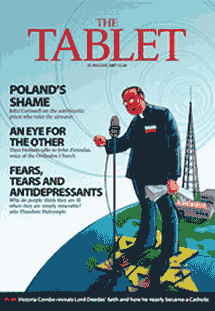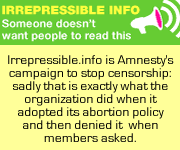Amnesty’s Orwellian Option
25 August 2007
 Ever since the Catholic Peter Benenson founded Amnesty International in 1961, the story of the pressure group has been one of heartbreak. While the group, now with 1.8 million members around the world, has been hugely successful in highlighting the plight of prisoners of conscience and helping to free some of them, its existence has not stemmed the tide of those persecuted for their beliefs by governments, despots and dictators. No wonder, then, that Michael Evans, Bishop of East Anglia, has said that the world needs Amnesty International.But the decision to change its stance on abortion, following a meeting of its leadership council in Mexico, is heartbreaking in a different way for its many Catholic supporters, both individuals and organisations such as Pax Christi and Sant’Egidio, that have worked alongside it for years. Despite protests during the last year over the proposed change of policy, the Mexico decision finally makes official the departure from Amnesty’s long-standing neutral position on abortion.
Ever since the Catholic Peter Benenson founded Amnesty International in 1961, the story of the pressure group has been one of heartbreak. While the group, now with 1.8 million members around the world, has been hugely successful in highlighting the plight of prisoners of conscience and helping to free some of them, its existence has not stemmed the tide of those persecuted for their beliefs by governments, despots and dictators. No wonder, then, that Michael Evans, Bishop of East Anglia, has said that the world needs Amnesty International.But the decision to change its stance on abortion, following a meeting of its leadership council in Mexico, is heartbreaking in a different way for its many Catholic supporters, both individuals and organisations such as Pax Christi and Sant’Egidio, that have worked alongside it for years. Despite protests during the last year over the proposed change of policy, the Mexico decision finally makes official the departure from Amnesty’s long-standing neutral position on abortion.
This is not the first time that Amnesty has moved away from its original focus on the plight of prisoners of conscience. Indeed some members and organisations have backed this expansion; Sant’Egidio, for example, supported its campaign against the death penalty. Its new position on abortion follows Amnesty’s decision to focus on the prevention of violence against women as an area of major concern and Catholics have, for example, supported its campaigning against rape. But there has been the inevitable worry that the expansion of purpose dilutes the impact the organisation has.
Under its new policy, confirmed in Mexico, Amnesty has gone much further. While Catholics may understand the desire to help women thrown into prison for having abortions, the notion that abortion is a human right, as Amnesty is now advocating, they would find impossible to support. It also appears to contradict Article Three of the Universal Declaration of Human Rights, which gives everyone the right to life, liberty and security of person. Instead Amnesty has chosen the Orwellian option, acknowledging the equal dignity of all human life but emphasising that some are more equal than others.
For Catholic supporters Amnesty’s abortion policy puts them in an unenviable position, torn between a desire to further Amnesty’s work for prisoners while unable to countenance its position on abortion. Bishop Michael Evans has already said that he will resign after 31 years as a member while not expecting every Catholic to do the same. The peace activist Bruce Kent has said that he will stay, but he hopes that some solution may be found through ring-fencing funds so that people could continue to back Amnesty without their money going towards its abortion project.
For a Catholic, conscience, the fundamental capacity for moral discernment, is always of prime importance. In discerning their choice, Catholics will need to focus on Amnesty’s slogan “Protect the human”. Their decision will ultimately depend on whether they believe they can compromise – that they can fight for those wrongly imprisoned by belonging to an organisation that does not seek to protect all human life – or need to take their talents elsewhere. Amnesty, in abandoning its neutral position, is forcing its members to take up a position themselves. Catholics can stay or quit, but indifference is not an option.
Church resists campaign to make abortion a right
30 June 2007
Catholic Bishops around the world are set on a collision course with the lobbying might of Amnesty International, now that its policy change on abortion has opened the way for the group to campaign to change legislation around the world, write Fredrick Nzwili and Abigail Frymann.
The recent repositioning – to favour the decriminalisation of abortion and call for access to abortion for victims of rape, incest and where the mother’s life is at risk – is to be used as a blueprint for Amnesty’s international lobbying work, a spokesman has confirmed to The Tablet, referring to abortion as a “right”.
“It’s about applying a right universally, globally, that women should be able to seek these safe and legal abortions. We identify countries where the rights of women need this particular focus and where Amnesty can bring its influence to bear.”
AI’s lobbying on abortion forms part of its Stop Violence Against Women campaign, its largest international campaign, which covers domestic violence, forced and early marriage and rape as a weapon of war.
However its effectiveness in these areas may be diminished if Catholics withdraw their support, as Kenya’s bishops have already done. “If I am going to fund a programme that is pro-abortion, is there any difference between me and that organisation? Absolutely not. Because the organisation is moving towards this direction, the links have to be severed,” Archbishop John Njue, Chairman of the Kenya Episcopal Conference (KEC), said at a press conference on Monday at the first national Catholic conference on Aids in Nairobi.
Miriam Kahiga, Amnesty International’s co-ordinator in Kenya, fiercely attacked the Church.
She told The Tablet: “The Catholic Church should be least to even talk about these things, because they have no experience in some of these things. They live in cloistered walls.”



September 30, 2007 at 4:19 pm
On the matter of Amnesty International, does a restricted practice of abortion e.g. in the case of a woman who is raped, trump all the good work that Amnesty International is doing for prisoners of conscience all over the world? Seems a poor trade-off indeed.